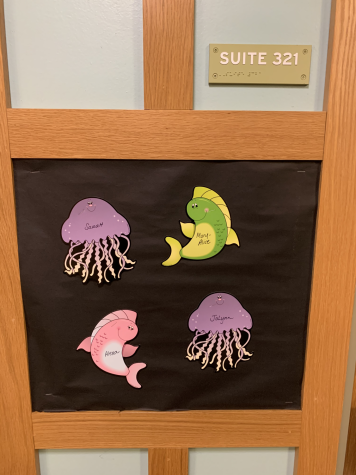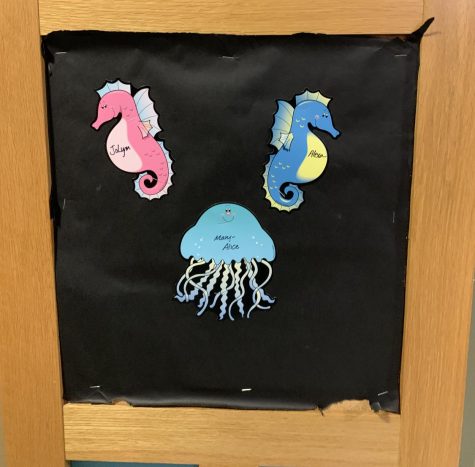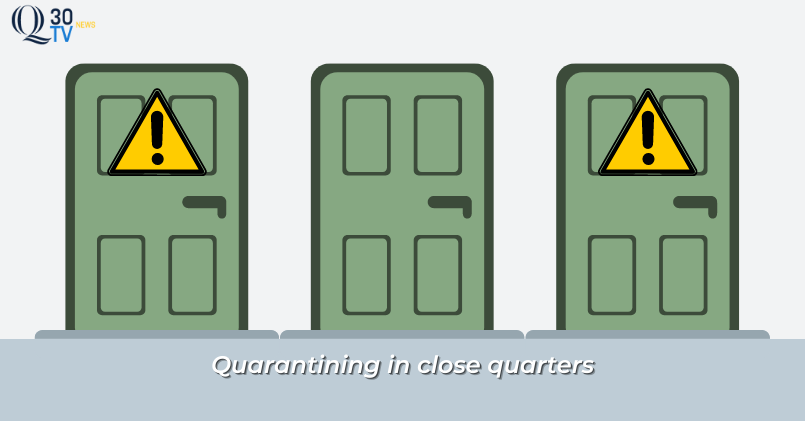Quinnipiac quarantine dorms are not just in Complex
March 15, 2021
Quinnipiac University is using fake names on residence hall door decorations to disguise COVID-19 quarantine rooms as typical rooms with full-time residents, and you could be sharing a wall with them.
Decals on the cork boards outside of suites with the reoccurring names “Mary Alice,” “JoLynn,” “Sarah” and “Alexa” have been spotted throughout Crescent, Quinnipiac’s largest residence hall located on the York Hill campus.

Emma Atkinson, a senior advertising major, picked up on her seemingly new neighbors with identical names, as a suite in her surrounding area had the same names as a suite that shares a wall with her very own.
She was never notified by the university that these dorms in her close quarters were designated as quarantine spaces. However, she said that the accidental knocks from public safety attempting to move students who were exposed to COVID-19 into her room instead of the suite next door gave it away.
“I was making soup and got an aggressive knock on my door followed by a public safety officer yelling,” Atkinson said. “I opened the door and the officer asked if this was a quarantine suite while a girl was sobbing behind him.”
Atkinson added that she is worried about the risk of air circulating between students who were exposed to COVID-19 and her suitemates, as she is “sandwiched” by two of these dorms.
John Morgan, the associate vice president of public relations, said that the placement of quarantined students does not pose a health-risk to students living in surrounding areas.
“There is no reason to be concerned about the vents in the building because air does not recirculate from suite to suite,” he said. “Our students’ health and safety is always our top priority.”
Atkinson feels as though quarantining students so close to each other goes against the idea of the university prioritizing their students’ health.
“At least label [the suite door] as a COVID suite instead of trying to hide it,” Atkinson suggested. “If public safety can’t even find the rooms to move people in, it’s not efficient.”
A resident assistant (RA) in Crescent, said that the residence hall directors crafted the door decals this semester, not the RAs.
“I’m assuming it’s probably to make other students think that there’s people living there,” the RA said.
They were right, John Morgan confirmed that “the labels are used to indicate that the suites are occupied.”
Atkinson said that though she remembered to put a mask on when she opened her door, other students may not think to do the same.
“It’s just not safe. No one is expecting a student who potentially has COVID outside of their room,” she said.
Atkinson added that she was unaware if these suites were dedicated to students in quarantine or students in isolation. A student in quarantine would have been exposed to COVID-19, while a student in isolation has tested positive with COVID-19.
The RA cleared that up and said the suites in Crescent are solely quarantine suites. On-campus isolation housing for students who test positive is located in Complex residence halls: Bakke, Sahlin and Founders.
They also added that quarantine suites existed in Crescent in the fall, but this new labeling system is something new to this semester, and she knows just as much about the COVID-19 quarantine rooms as her own residents.
“As of right now [RAs] are not made aware of when students move into quarantine spaces,” the RA said.
Over winter break, some students who didn’t have full suites in Crescent received an email from the university asking if they would relocate for the semester so that their rooms could be used as quarantine spaces.
“I noticed the girls who originally lived in the suite next to me were not there anymore,” Atkinson said. “I didn’t think anything of it until public safety came knocking.”
She added that she wished she and her suitemates would have been notified that they were “going to be surrounded by possible COVID.”
The RA agreed with Atkinson, but understands that some things should be kept confidential.
“As students, we should know so that we are aware and taking the necessary precautions. On the other hand, [we shouldn’t know] because of the privacy of those students in quarantine,” the RA said.
The names on the doors ironically are not student names, but instead, faculty members at Quinnipiac. Though the faculty members with these names likely had nothing to do with the labeling as most of them are from different departments, it is important to note that their names may have been pulled from their roles on campus.

The COVID-19 task force declined to comment on the situation.
**Editor’s note: The RA was named in the original version of this story.**






